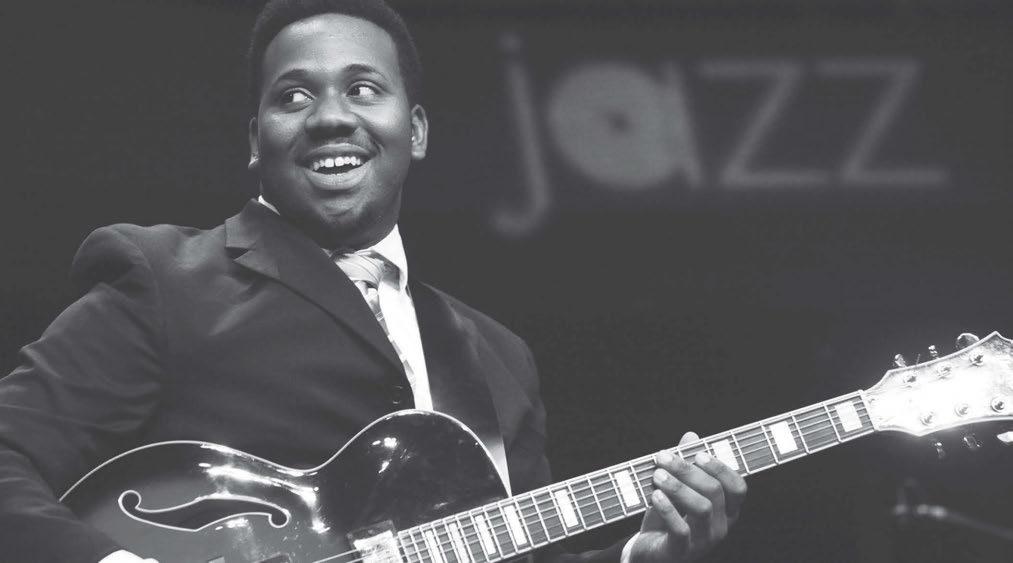
3 minute read
Developing Musicianship Through
Do you know someone who can improvise? Chances are they know a lot of tunes and learn new tunes with relative ease . It seems that improvisers can sing and/or play anything that comes to mind Improvisers are in the moment and interact to create experiences that are unique Many accomplished musicians do not think of themselves as improvisers, yet, if they have something unique to say in their performance, they are improvisers . In that sense, we are all improvisers, and it is important to have opportunities to express ourselves creatively through improvisation throughout our lives
Improvisation in music is the spontaneous expression of meaningful musical ideas - it is analogous to conversation in language Key elements of improvisation include personalization, spontaneity, anticipation, prediction, interaction, and being “in the moment ” Interestingly, we are born improvisers, as evidenced by our behavior in early childhood . This state of mind is clearly demonstrated in children’s play When not encouraged to improvise as a part of our formal music education, the very thought of improvisation invokes fear If we let go of that fear, we find that indeed we are improvisers Improvisation enables musicians to express themselves from an internal source and is central to developing musicianship in all aspects of music education
Advertisement
The process of learning music is much the same as the process of learning language Think for a moment about how you learned language First you listened to language From birth and even before, you were surrounded by the sound of language and conversation You absorbed these sounds and became acculturated to the language Soon you began to imitate the words and phrases that you heard spoken by your parents and siblings Before you were successful at imitating, you were praised for your efforts and encouraged to “babble,” even when the sounds you were making did not make complete sense to others Eventually you began to associate words (names) with people, things, feelings, desires, etc and you began to make statements and ask questions that were your own .You began to think and improvise in the language, and your interaction with parents and siblings was crucial to your language acquisition After several years of developing your ability to think and speak, years of being surrounded by print, and years of being read to by others, you learned to read and write You learned to read and write with understanding because of the experiences you had listening, thinking, and speaking
Just as it is possible for everyone to learn a language and engage in meaningful conversation, it is also possible for everyone to engage in meaningful improvisation Improvisation is at the core of the music learning process, and like conversation in language, interaction with others is crucial First, you should listen to music and learn to sing and play by ear many melodies and bass lines in many different tonalities, meters, and styles The objective is not to “memorize” the tunes . After all, you didn’t “memorize” your speech as a child Rather, the objective is to internalize so many melodies and bass lines that you begin to hear harmonic progressions (“the changes”) and generate your own melodic lines
As you build a repertoire of tunes and a sense of musical style, you should develop an understanding of harmonic progression, harmonic rhythm, and the aural skills to listen to music meaningfully and to interact expressively with others You also should learn a vocabulary of tonal patterns, melodic phrases, rhythm patterns, and rhythm phrases that you will apply in many ways as an improviser and when you read and write music, thus connecting your improvisation to meaningful experiences with notation The objective is to read and write music with comprehension
You will hear and understand the music documented on the page in the context of what you have created and improvised You will also gain a greater understanding of music you hear in everyday experiences
When reading music, it is important to remember that notation is documentation of a creative process Learning to read and write music should be presented in light of that creativity Developing your musicianship through improvisation provides a context for reading and composing music with comprehension When musicians express themselves by putting together their own musical thoughts in composition, they can create, develop, and reflect on musical ideas . Composers are able to “go back’’ or “move forward” in time as they create This reflection and revision process is a good way to discover relationships in music, and as a result, improve your overall musicianship
Developing Meaningful Improvisations
Presented here are additional suggestions for your continued growth as an improviser . The suggestions and the improvisation rating scale that follow provide you with many ways to improve your musicianship as you acquire improvisation skills To get started, you may wish to practice one or two of the following concepts at a time With experience, you will internalize these ideas and begin to develop more meaningful improvisations .
A good place to start this process is by listening to other musicians Become aware of how improvisers:
• personalize melodies with expressive phrasing, dynamics and tonal and rhythmic variation
• are spontaneous and in the moment
• play with space (silence)
• interact with each other
• develop motives
• understand harmony and rhythm by ear
• can play anything that comes to mind
The following ideas will help to improve your skills as an improvising musician
• Learn a repertoire of tunes and improvised solos by ear from other musicians and by listening to recordings Developing a large repertoire of tunes by ear will provide a basis for developing your own improvised solos






